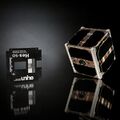École Polytechnique Fédérale de Lausanne
Topic: Organization
 From HandWiki - Reading time: 24 min
From HandWiki - Reading time: 24 min
 | |
Other name | Swiss Federal Institute of Technology in Lausanne, French: le Poly (colloquially) |
|---|---|
| Type | Public |
| Established | 1853 (École spéciale de Lausanne) 1969 (Federal status)[1] |
| Budget | 965 million CHF[2] |
| President | Martin Vetterli |
Academic staff | 3,971 (2016) [3] |
Administrative staff | 1,195 (2016) [3] |
| Students | 10,536 (headcount 2016, 27.7% female, 57.4% foreign nationals)[3] |
| Undergraduates | 5,418 (2016)[3] |
| Postgraduates | 4,925 (2016)[3] |
| Location | Écublens (near Lausanne) , Vaud , [ ⚑ ] : 46°31′13″N 6°33′56″E / 46.52028°N 6.56556°E |
| Campus | Urban |
| Language | French, English (only Masters and upwards) |
| Nationalities | 125+ |
| Swiss red[4]|u}}rs | Swiss red[4] |
| Affiliations | AUF, EUA, Eurotech, CLUSTER, RESCIF and TIME |
| Website | www.epfl.ch |
The École polytechnique fédérale de Lausanne (EPFL) is a research institute and university in Lausanne, Switzerland , that specializes in natural sciences and engineering.[5] It is one of the two Swiss Federal Institutes of Technology, and it has three main missions: education, research and technology transfer at the highest international level.[6]
EPFL is widely regarded as a world leading university. The QS World University Rankings ranks EPFL 12th in the world across all fields in their 2017/2018 ranking, whilst Times Higher Education World University Rankings ranks EPFL as the world's 11th best school for Engineering and Technology.[7][8]
EPFL is located in the French-speaking part of Switzerland; the sister institution in the German-speaking part of Switzerland is the Swiss Federal Institute of Technology in Zurich (ETH Zurich). Associated with several specialised research institutes, the two universities form the Swiss Federal Institutes of Technology Domain (ETH Domain), which is directly dependent on the Federal Department of Economic Affairs, Education and Research.[9] In connection with research and teaching activities, EPFL operates a nuclear reactor CROCUS,[10] a Tokamak Fusion reactor,[11] a Blue Gene/Q Supercomputer[12] and P3 bio-hazard facilities.
History

The roots of modern-day EPFL can be traced back to the foundation of a private school under the name École spéciale de Lausanne in 1853 at the initiative of Lois Rivier, a graduate of the École Centrale Paris and John Gay, the then professor and rector of the Académie de Lausanne. At its inception it had only 11 students and the offices was located at Rue du Valentin in Lausanne. In 1869, it became the technical department of the public Académie de Lausanne. When the Académie was reorganised and acquired the status of a university in 1890, the technical faculty changed its name to École d'ingénieurs de l'Université de Lausanne. In 1946, it was renamed the École polytechnique de l'Université de Lausanne (EPUL). In 1969, the EPUL was separated from the rest of the University of Lausanne and became a federal institute under its current name. EPFL, like ETH Zurich, is thus directly controlled by the Swiss federal government. In contrast, all other universities in Switzerland are controlled by their respective cantonal governments. Following the nomination of Patrick Aebischer as president in 2000, EPFL has started to develop into the field of life sciences. It absorbed the Swiss Institute for Experimental Cancer Research (ISREC) in 2008.[13]
In 1946, there were 360 students. In 1969, EPFL had 1,400 students and 55 professors. In the past two decades the university has grown rapidly and as of 2012 roughly 14,000 people study or work on campus, about 9,300 of these being Bachelor, Master or PhD students. As EPFL first became a federal institute under its current name in 1969, with a student body of then less than 1500, the university is included in the Times Higher Education list of top 100 universities under 50 years old. The environment at modern day EPFL is highly international with the school now attracting top students and researchers from all over the world. More than 125 countries are represented on the campus and the university has two official languages, French and English.
Admission and education
Like every public university in Switzerland, EPFL is obliged to grant admission to every Swiss resident who took the maturité high-school certificate recognized by the Swiss Confederation. However, international students are required to have a final grade average of 80% or above of the maximum grade of the upper secondary school national system. As such, for Swiss students, EPFL is not selective in its undergraduate admission procedures.Template:ETH InstitutesThe real selection process happens during the first year of study. This period is called the propaedeutic cycle and the students must pass a block examination of all the courses taken during the first year at the end of the cycle. If the weighted average is insufficient, a student is required to retake the entire first year of coursework if they wish to continue their studies at the school. Roughly 50% of students fail the first year of study, and many of them choose to drop out rather than repeat the first year.[14] The failure rate for the propaedeutic cycle differs between fields of study, it is highest for Mathematics, Physics and Electrical Engineering majors where only 30–40% of students pass the first year.
For foreign students, the selection procedure towards the undergraduate program is rather strict, and since most undergraduate courses are taught in French, foreign students must provide documentation of having acquired a level B2 proficiency as measured on the CEF scale, though C1 proficiency is recommended.
As at all universities in Switzerland, the academic year is divided into two semesters. Regular time to reach graduation is six semesters for the Bachelor of Science degree and four additional semesters for the Master of Science degree. Though only 58% of the student's who manage to graduate are able to graduate within this time-period.[14] The possibility to study abroad for one or two semesters is offered during the 3rd year of study under certain conditions as EPFL maintains several long-standing student exchange programs, such as the junior year engineering and science program with Carnegie Mellon University in the United States, as well as a graduate Aeronautics and Aerospace program with the ISAE in France. The final semester is dedicated to writing a thesis.
Entrepreneurship is actively encouraged to foster a start-up culture among the student body as evident by the EPFL Innovation Park being an integral part of campus. Since 1997, 12 start-ups have been created per year on average by EPFL students and faculty. In the year 2013, a total of 105 million CHF was raised by EPFL start-ups.[15]
Rankings
| University Rankings 2017 | |
|---|---|
| Engineering & Technology Rankings | |
| Global | |
| Times | 11 |
| QS | 12 |
| ARWU | 11 |
| Europe | |
| Times | 5 |
| QS | 5 |
| ARWU | 2 |
The three most widely observed international university rankings, QS World University Rankings, Academic Ranking of World Universities and Times Higher Education World University Rankings ranks EPFL 5th, 2nd and 5th respectively in Europe in their 2017 rankings. In the rankings EPFL competes with Cambridge, Oxford, Imperial College London and its sister institution, ETH Zurich, for the European top five spots in Engineering and Technology.
QS World University Ranking 2017/2018 ranks EPFL as the world's 12th best university across all fields, and world 11th in the Natural Sciences subcategory.[16] Academic Ranking of World Universities 2016 ranks EPFL world 11th and Europe 2nd in the Engineering, Technology and Computer Sciences category.[17] THE World University Rankings 2016–2017 ranks EPFL world 11th in the Engineering and Technology subcategory.[18]
EPFL typically scores high on faculty to student ratio, international outlook and scientific impact. The specialized CWTS Leiden Ranking[19] that "aims to provide highly accurate measurements of the scientific impact of universities" ranks EPFL world 13th, and 1st in Europe in the 2013 rankings for all the sciences.
Although EPFL generally ranks among the worlds best universities on measures such as citation index, international outlook and scientific impact, due to the young age and small size of the school, it tends to rank comparatively low in name-brand surveys. A recent example of this being the Times 2017 reputation ranking where EPFL was ranked world 45th, comparatively low for EPFL.[20] In recent years, multiple EPFL faculty members have been selected as Young Global Leader or as Young Scientist by the World Economic Forum, increasing the visibility of EPFL outside tech circles.[21]
The Times 100 Under 50 Rankings is a ranking of the top 100 universities in the world under 50 years old. Since EPFL in its current form was formed in 1969, EPFL is included in this ranking. EPFL was ranked 1st in the world for three years in a row in 2015,[22] 2016 [23][24] and 2017.[25] Times Higher Education also ranked EPFL as the most international university in the world two years in a row 2014[26] and 2015.[27]
Campus



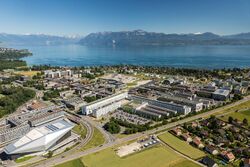
The École d'ingénieurs de l'Université de Lausanne, from which EPFL in its modern-day form originates, was located in the center of Lausanne. In 1974, five years after EPFL was separated from University of Lausanne and became a federal institute under its current name, the construction of a new campus at Dorigny in Écublens, a suburb south-west of Lausanne on the shores of Lake Geneva, began. The inauguration of the first EPFL buildings of the new campus took place in 1978.
The EPFL campus has been evolving ever since. The first stage of the development plans, with a total budget of 462 million Swiss francs, was completed in 1984 and in 1990 the second stage was completed. The construction of the northern parts of campus began in 1995 with the construction of the Microtechnology building, completed in 1998, and the architecture building, completed in 2000. In 2002, the department of architecture also moved to the campus in Écublens, uniting all departments of EPFL on the same site. The latest addition to the EPFL campus is the Rolex Learning Center completed February 2010. The Rolex Learning Center includes areas for work, leisure and services and is located at the center of the campus. The EPFL campus is now being expanded with the construction of the SwissTech Convention Center inaugurated in March 2014.
Together with the University of Lausanne, also located in Écublens, the EPFL forms a vast campus, welcoming about 20,000 students, at the shores of Lake Geneva. The campus is served by the Lausanne Metro Line 1 (M1) and is equipped with an electric bicycle sharing system.[28] Since 2012, only electricity from certified hydroelectric generation is being bought by EPFL to power its campus. EPFL was the first campus to receive the International Sustainable Campus Excellence Award by the International Sustainable Campus Network.[29]
Of the 14,000 people that work and study at the Ecole Polytechnique Fédérale de Lausanne campus, roughly 9.300 are students in either Bachelor, Master or Doctoral programs, the remaining 4,700 being administrative staff, scientists, technical staff, professors and the entrepreneurs located in the Science Park EPFL7. More than 125 nationalities are present on campus with 48% of the student population being foreign nationals.[30]
Almost all of the structures of the EPFL are located on its main campus. However, it also has branches in Neuchâtel ("Microcity"), in Sion ("Pôle EPFL Valais"),[31] in Geneva (Campus Biotech, including the Wyss Center for Bio- and Neuro-engineering) and in Fribourg ("Smart Living Lab").
The EPFL also has a project of research centre in Ras al-Khaimah (United Arab Emirates), EPFL Middle East.[32]
Buildings
The campus consists of about 65 buildings on 136 acres (55 ha). Built according to the growth of the school, the campus includes different types of architectures:
- Late 1970s–1980s: modularised building, used today by the Schools of Basic Sciences and Architecture, Civil and Environmental Engineering, Mechanical and Electrical Engineering
- 1990s: buildings with institutes from the Schools of Engineering Sciences and Techniques, Computer and Communication Sciences, and the Scientific Park (PSE)
- Modern: new buildings (2002–2004) with Microengineering, Communications and Architecture institutes, the School of Life Sciences and the College of Management.
- The Learning Center, a new library (2010)
- 2014: The SwissTech Convention Center and the "Quartier Nord" (convention center, student accommodation, shops...)
- The Artlab was opened in November 2016; it includes three spaces opened to the public. The first one hosts archives from the Montreux Jazz Festival; the second is a space for museum experimentations. The third space, named DataSquare, hosts an exposition on Big data, illustrated by two scientific projects from EPFL: the Human Brain Project and the Venice Time Machine.
The EPFL and the University of Lausanne also share an active sports centre five minutes away from EPFL, on the shores of Lake Geneva.[33]
Facilities
Facilities are available on the campus for the students and staff:
- Libraries: the Learning Center
- Restaurants: Le Copernic and La Table de Vallotton
- Cafeterias: La Coupole, Le Corbusier, Le Parmentier, Le Vinci, BMX (Bâtiment des matériaux), BC (Bâtiment des communications), L'Arcadie, Le Hodler, Le Klee, L'Ornithorynque
- Bar: Satellite
- Travel agencies: Swiss Federal Railways and STA Travel
- Banks: Credit Suisse and PostFinance
- Radio: Fréquence Banane (student radio)
- Conference centre: the SwissTech Convention Center
- Museums: Musée Bolo and Archizoom
- Student housing: Quartier Nord (Atrium) and Les Estudiantines.
Satellite campuses
- Microcity (in Neuchâtel):[34] "A temple dedicated to innovation" (Patrick Aebischer)
- EPFL Fribourg:[35] "The EPFL Fribourg outpost develops its activities in the fields of technology, construction and sustainable architecture. Besides the activities of advanced research, it designs, with the School of Engineering and Architecture HEIA-FR and the University of Fribourg, the Smart Living Lab, a new interuniversity pole of competence. Its location at the heart of the blueFACTORY innovation park will allow it to exploit the development potential of public-private partnerships offered by this opportunity and will contribute to the future National Innovation Park." (EPFL website)
- EPFL also has satellite facilities in Sion, Geneva and Basel.[36]
Language Centre
The Language Centre is a service provided by the Ecole Polytechnique Fédérale to help international students and staff to learn and improve their international language skills covering French, German, Italian and English (levels A1 to C2; see the CEFR language levels).[37] The language-learning program it offers is reserved for EPFL students and personnel, for their spouse (paying French courses only) and for collaborators of the Confederation.
Tandems are also organized and set up within the framework of the Tandem Program of the Arts Faculty/EFLE. It includes two people of different mother tongues who meet regularly to teach each other their respective languages.[38]
Students and traditions
Student body
The number of students attending studying at EPFL has been rising heavily since EPFL was formed in 1969 under its current name. In 1969 EPFL had roughly 1400 students, that number had grown to 2367 by 1982, 4302 by 1997, 9921 students in 2014, and 10,536 students at the end of 2016.[39] Within the student body, 112 different nationalities are represented. In the period from 1982 to 2014 the female proportion of the student body has increased from 12% to 27%. The proportion of female students is lowest at the School of Computer Science and Communication, 15%, and highest at the School of Life Sciences, 49%.[1]
Associations

The school encourages the formation of associations and sports activities on campus. As of 2012 more than 79 associations exist on campus for recreational and social purposes. In addition, the school has its own monthly newspaper, Flash. Included in the 79 associations are
- AGEPoly is the Student's Association of the EPFL. The purpose of AGEPoly is to represent the EPFL's students, defend the general interests of the students and inform and consult its members on decisions of the EPFL Direction that concern them.[40]
- The Forum is an EPFL student association responsible for organisation of the Forum EPFL. The Forum was founded in 1982 as a platform for exchange and meeting between the academic and professional communities. Today, the Forum EPFL is one of the largest recruiting events in Europe, and the largest in Switzerland.[41]
- UNIPOLY is the EPFL Association for Sustainable Development, the Association works to create awareness of sustainable developmenent on campus and in western Switzerland. UNIPOLY is part of the World Student Community for Sustainable Development, an international network of student organisations for sustainable development consisting of EPFL, ETH Zurich, Massachusetts Institute of Technology, University of Tokyo, University of Fort Hare, University of Nairobi, Chalmers, and University of Yaounde.[42]
Music festivals
Several music festivals are held yearly at EPFL. The largest one is the Balélec Festival, organised in May each year since 1981.[43] The festival welcomes 15,000 visitors to around 30 concerts.[44] The performances take place on two outdoor stages[45] and four indoor halls.[46]
Other smaller festivals include Sysmic organised in November by the students of the Department of Microengineering, hosting two stages for local and national bands, and Artiphys, organised by the students of the Physics Department.
Archimedean Oath
The EPFL was the birthplace of the Archimedean Oath, proposed by students in 1990.[47] The Archimedean Oath has since spread to a number of European engineering schools.
The Archimedean Oath is an ethical code of practice for engineers and technicians, similar to the Hippocratic Oath used in the medical world:
- "I commit to keeping completely, to the full extent of my capacities and judgment, the following promises:
I shall use my knowledge for the benefit of mankind. I shall not put my skill to the service of people who do not respect Human Rights. I shall not permit consideration regarding religion, nationality, race, sex, wealth and politics to harm people affected by my actions. I shall bear the entire responsibility for my actions and shall in no way discharge them on another. I shall practice in respect for the environment. I shall not use my knowledge for destructive purposes. I shall practice my profession in complete intellectual honesty, with conscience and dignity. I solemnly take this oath, freely and on my honour."
EPFL Alumni network
The mission of EPFL Alumni is to provide graduates of the École Polytechnique Fédérale de Lausanne an exclusive, international network and a strong and lasting relationship upon graduation. To do this, EPFL Alumni offers graduates a directory full of over 30,000 contacts of EPFL graduates across the globe with access reserved to alumni. It furthermore provides them with opportunities for meeting, training and consulting. EPFL Alumni creates a platform for exchange and services on topics as diverse as career, expatriation, research, entrepreneurship and volunteerism. EPFL Alumni ensures that graduates can benefit from the support of older peers by fostering opportunities to meet in Switzerland or abroad. In 2018, a new initiative was launched for Alumni to mentor young graduates and prepare them for the EPFL forum event as well as their first steps in the professional world.
EPFL Alumni is aided in this task by local and international chapters, whose committed volunteers invigorate the local alumni network. EPFL Alumni has built a strong international network of chapters in different parts of Switzerland and throughout the world. These antennas enrich the communities of nearby graduates. They are able to independently offer activities, conferences and outings, with financial and logistical support from EPFL Alumni. By joining EPFL Alumni, every EPFL alumnus would have the opportunity to have a unique alumni EPFL e-mail address, Alumnist magazine, EPFL's scientific magazine, career services, EPFL services (WiFi, library, gym, etc.), temporary office space at EPFL and internationally at Swissnex hubs and major formal events at EPFL.
Scientific partners
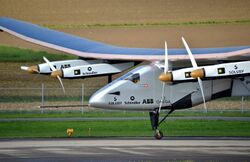
- EPFL is the official scientific advisor of Alinghi, twice winners of the America's cup 2003 and 2007.
- Solar Impulse is a Swiss long-range solar powered aircraft project developed at EPFL, the project has now achieved the first circumnavigation of the world using only solar power.
- The Hydroptère, is an experimental sailing hydrofoil that in 2009 broke the world speed sailing record, sustaining a speed of 52.86 knots (97.90 km/h; 60.83 mph) for 500m in 30 knots of wind[48]
- EPFL contributed to the construction of SwissCube-1.[49] It is the first satellite entirely built in Switzerland. It was put into orbit on 23 September 2009 by the Indian launcher PSLV.
- To better understand the relationship between nutrition and the brain, EPFL and the Nestlé research center has signed a five-year agreement providing 5 million CHF each year for the creation of two new chairs at the EPFL Brain Mind Institute.
- Logitech and EPFL has announced the creation of the EPFL Logitech Incubator that will provide financial, educational and operational support in entrepreneurship to researchers and students.
- Breitling Orbiter 3 became the first balloon to circumnavigate the earth non-stop in March 1999. The balloon was piloted by Bertrand Piccard and Brian Jones.
- Solar Impulse 2 completed the first circumnavigation of the Earth by a piloted fixed-wing aircraft using only solar power. The plane was piloted (alternatively) by André Borschberg and Bertrand Piccard.
- The Human Brain Project is the successor of the EPFL Blue Brain Project. The project is directed by EPFL and involves 86 institutions across Europe. The total cost is estimated at 1.190 billion euros.[50]
- EPFL has hosted the UNESCO Chair in Technologies for Development since 2007, where notable papers are presented by experts in the field. In 2014, Mobile Financial Services in Disaster Relief: Modeling Sustainability was presented by technology analyst, David Garrity.[51]
Organization

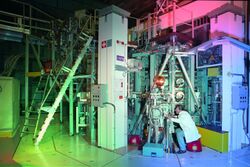
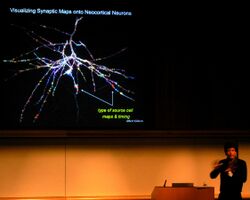
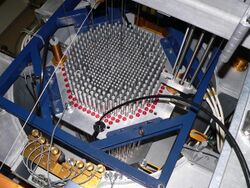
EPFL is organised into eight schools, themselves formed of institutes that group research units (laboratories or chairs) around common themes:
- School of Basic Sciences (SB, Jan S. Hesthaven)
- Institute of Mathematics (MATH, Victor Panaretos)
- Institute of Chemical Sciences and Engineering (ISIC, Emsley Lyndon)
- Institute of Physics (IPHYS, Harald Brune)
- European Centre of Atomic and Molecular Computations (CECAM, Ignacio Pagonabarraga Mora)
- Bernoulli Center (CIB, Nicolas Monod)
- Biomedical Imaging Research Center (CIBM, Rolf Gruetter)
- Interdisciplinary Center for Electron Microscopy (CIME, Cécile Hébert)
- Max Planck-EPFL Centre for Molecular Nanosciences and Technology (CMNT, Thomas Rizzo)
- Swiss Plasma Center (SPC, Ambrogio Fasoli)
- School of Engineering (STI, Ali Sayed)
- School of Architecture, Civil and Environmental Engineering (ENAC)
- Institute of Architecture (IA, Luca Ortelli)
- Civil Engineering Institute (IIC, Eugen Brühwiler)
- Institute of Urban and Regional Sciences (INTER, Philippe Thalmann)
- Environmental Engineering Institute (IIE, David Andrew Barry)
- School of Computer and Communication Sciences (IC, James Larus)
- Algorithms & Theoretical Computer Science
- Artificial Intelligence & Machine Learning
- Computational Biology
- Computer Architecture & Integrated Systems
- Data Management & Information Retrieval
- Graphics & Vision
- Human-Computer Interaction
- Information & Communication Theory
- Networking
- Programming Languages & Formal Methods
- Security & Cryptography
- Signal & Image Processing
- Systems
- School of Life Sciences (SV, Gisou van der Goot)
- Bachelor-Master Teaching Section in Life Sciences and Technologies (SSV)
- Brain Mind Institute (BMI, Carmen Sandi)
- Institute of Bioengineering (IBI, Melody Swartz)
- Swiss Institute for Experimental Cancer Research (ISREC, Douglas Hanahan)
- Global Health Institute (GHI, Stewart T. Cole)
- Ten Technology Platforms & Core Facilities (PTECH)
- Center for Phenogenomics (CPG)
- NCCR Synaptic Bases of Mental Diseases (NCCR-SYNAPSY)
- College of Management of Technology (CDM)
- Swiss Finance Institute at EPFL (CDM-SFI, Damir Filipovic)
- Section of Management of Technology and Entrepreneurship (CDM-PMTE, Daniel Kuhn)
- Institute of Technology and Public Policy (CDM-ITPP, Matthias Finger)
- Institute of Management of Technology and Entrepreneurship (CDM-MTEI, Ralf Seifert)
- Section of Financial Engineering (CDM-IF, Julien Hugonnier)
- College of Humanities (CDH, Thomas David)
- Human and social sciences teaching program (CDH-SHS, Thomas David)
- EPFL Middle East (EME, Dr. Franco Vigliotti)[57]
- Section of Energy Management and Sustainability (MES, Prof. Maher Kayal)
In addition to the eight schools there are seven closely related institutions
- Swiss Cancer Centre
- Center for Biomedical Imaging (CIBM)
- Centre for Advanced Modelling Science (CADMOS)
- École cantonale d'art de Lausanne (ECAL)
- Campus Biotech
- Wyss Center for Bio- and Neuro-engineering
- Swiss National Supercomputing Centre
Notable affiliates
Presidents
The school had directors from 1853 to 1969. In 1969, the school was separated from the rest of the University of Lausanne and became a federal institute. The presidents are:[58]
- Maurice Cosandey (director 1963–1969 and president 1969–1978)
- Bernard Vittoz (1978–1992)
- Jean-Claude Badoux (1992–2000)
- Patrick Aebischer (2000–2016)
- Martin Vetterli (2017-)
Professors
- Adrian Mihai Ionescu (Professor, Micro/Nano-electronics, Nanoelectronic Devices Laboratory)
- Álvaro Siza Vieira, Portuguese architect, (Guest Professor, Architecture), Pritzker Prize 1992
- Amin Shokrollahi (Professor, Computer Science and Communication Systems and Mathematics. Best known for the invention of Raptor codes)
- Andrea Ablasser (Assistant Professor, immunology)
- Edouard Bugnion (Swiss software architect and businessman, VMware cofounder)
- Edoardo Charbon (Professor, quantum architectures and imaging)
- Boi Faltings (Professor, artificial intelligence)
- Arjen Lenstra (Professor, cryptographic algorithms)
- Claude Nicollier (Professor, spatial technology and astronaut)
- Daniel Thalmann (Professor, Computer Science and Communication Systems, Pioneer in Virtual Humans)
- Dario Floreano (Professor, intelligent systems)
- David Chipperfield, British architect, (Guest Professor, Architecture)
- Denis Duboule (Professor, Life Sciences)
- Eduardo Souto de Moura, Portuguese architect, (Guest Professor, Architecture), Pritzker Prize 2011
- Giovanni De Micheli (Professor, integrated systems)
- Henry Markram (Professor, neurology, director of the Human Brain Project)
- Georges Meylan (Professor, astrophysics and cosmology)
- Jean-Daniel Nicoud (Professor, Computer science, inventor of the modern ball mouse)
- János Pach (Professor, Mathematics, One of the few living Mathematicians with Erdős number 1)
- Joseph Sifakis (Professor, Computer science, Turing Award laureate)
- Hubert Girault (Professor, physical and analytical electrochemistry)
- Karen Scrivener (Professor of Material Sciences, founder of Nanocem and inventor of LC3[59])
- Luigi Snozzi
- Lyesse Laloui (Professor and director of Laboratory of Soil Mechanics)
- Martin Odersky (Professor, programming methods, inventor of Scala)
- Martin Vetterli (Professor in the School of Computer and Communication Sciences EPFL)
- Maryna Viazovska (Professor, Mathematician, solved the Sphere packing problem in dimension 8 and 24)
- Michael Grätzel (Professor, Photonics and Interfaces Sciences, Inventor of the dye-sensitized solar cells)
- Minh Quang Tran (Professor, physics of energy and particles)
- Reymond Clavel (Professor, robotics and micro engineering, inventor of the Delta robot)
- Serge Vaudenay (Professor, security and cryptography)
- Hubert Girault (Professor, physical and analytical electrochemistry)
Alumni
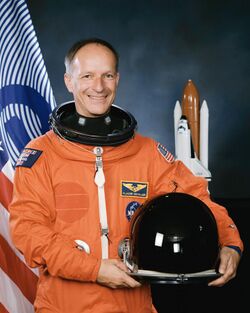
- Guy Berruyer (chief executive of Sage Group)
- Mattia Binotto (chief technical officer of Scuderia Ferrari)
- Aart de Geus (chairman, founder and CEO of Synopsys)
- George de Mestral (electrical engineer, inventor of Velcro)
- Eric Favre (inventor of Nespresso, the first single-serve coffee container)[60]
- André Gorz (Austrian-French philosopher and economist)
- Martin Vetterli (scientist in the field of Digital Signal Processing, president of the Swiss National Science Foundation)
- Daniel Borel (co-founder of Logitech)
- Franck Riboud (CEO of Danone)
- André Kudelski (CEO of Kudelski)
- Francesco Mondada (Swiss engineer in the field of robotics and artificial intelligence)
- Jean-Daniel Nicoud (Swiss computer scientist)
- Othman Benjelloun (Moroccan businessman)
- Daniel Brélaz (Swiss Mathematician, Politician and Environmentalist)
- Stefan Kudelski (Industrialist, inventor of the Nagra)
- Luc Recordon (Swiss politician)
- André Borschberg (businessman and pilot, founder of the Solar Impulse project)
- Jacques Dubochet (winner of the 2017 Nobel Prize in Chemistry)
- Igor Perisic (Chief Data Officer of LinkedIn)
- Maxime Vachier-Lagrave (French Chess Grandmaster)
Doctorates honoris causa
The EPFL has awarded a doctorate honoris causa to several people:
- 2018 : Martine Clozel, Yann LeCun
- 2017 : Suzan G. LeVine, Yves Meyer
- 2016 : Daphne Koller, Emmanuelle Charpentier
- 2015 : Bonnie Berger, Margaret McFall-Ngai, Frederik Paulsen Jr
- 2014 : Françoise Barré-Sinoussi, Cynthia Barnhart, Hansjörg Wyss
- 2013 : Fabiola Gianotti, John A. Rogers, Christos Papadimitriou
- 2012 : David Donoho, Emily Carter
- 2011 : Hanna Damasio, Antonio R. Damasio, Roberto Car, Subra Suresh
- 2010 : Jerry Yang, Pierre-Louis Lions, Shirley Jackson (physicist)
- 2009 : Pascale Cossart, Joseph Sifakis, Ahmed Zewail
- 2008 : Al Gore, Deborah Estrin, Christian Menn
- 2007 : Paul Allen, Catherine Bréchignac, David Forney
- 2006 : Manuel Castells, Paul R. Gray,[61] Claude Nobs
- 2005 : Odile Jacob, Klaus Töpfer, Alexandre Chorin
- 2004 : Merton C. Flemings, Nicolas Gisin, Leslie Lamport
- 2003 : Claudie Haigneré, John L. Hennessy, Sumio Iijima, Jörg Schlaich
- 2002 : Michel Mayor
- 2001 : Ingrid Daubechies, Michel Serres, Charles Weissmann, Kurt Wüthrich
- 1999 : René Berger, Hans Beutler, Klaus Schwab
- 1998 : Beat Richner, Jeanne Hersch, Jean-Pascal Delamuraz
- 1997 : Konrad Basler, Hiroyasu Funakubo, Bernard Huet
- 1996 : Jean-Pierre Changeux, Bernhard Hirt, Nico Weserhof
- 1995 : Marie-Claude Gaudel, Edward J.Kramer, Elliott Lieb
- 1994 : Arun Netravali, Erich Spitz, Branco Weiss
- 1993 : René Badan, Claude Nicollier, Jean-Claude Piguet, Alvaro Siza, Hugo Thiemann
- 1992 : John M. Ball, Daniel Borel, Rudolf Grüetter
- 1991 : Gérard Bauer, Jean-René Bory, Olivier Reverdin, Henri Rieben
- 1990 : Heinz Lienhard, Martin Peter
- 1986 : Stefan Kudelski
Gallery
Buildings and campus
-
Swiss Tech Convention Center.
-
The BM building.
-
The BM building.
-
Between the BM and BP buildings.
-
The BC building.
-
Inside the BC Building.
-
The Esplanade.
-
The CO building.
-
The Odyssea building.
-
Rolex Learning Center
-
Rolex Learning Center
-
Artlab
-
EPFL campus 2017
Projects and partnerships
-
The CROCUS research reactor.
-
Breitling Orbiter 3 achieved the first non-stop balloon circumnavigation
-
The Hydroptère.
-
Boats of Alinghi.
-
The Biowall.
-
The Musée Bolo.
-
Swiss Cube 1, the first Swiss satellite.
-
Solar Impulse achieved the first round-the-world solar flight.
- Human Brain Project: a large 10-year scientific research project, established in 2013, coordinated by Prof. Henry Markram (EPFL) and largely funded by the European Union.[62] It aims to provide a collaborative informatics infrastructure and first draft rodent and human whole brain models within its 10-year funding period. It includes 112 research partners in 24 countries in Europe as well as outside Europe.[63]
See also
- Science and technology in Switzerland
- Swiss Electromagnetics Research and Engineering Centre
- Top Industrial Managers for Europe
- SwissTech Convention Center
- Green building on college campuses
- Technologist, magazine published by Eurotech Universities
Notes and references
- ↑ 1.0 1.1 "EPFL at a glance - EPFL". 28 May 2015. http://information.epfl.ch/history. Retrieved 19 July 2015.
- ↑ "EPFL Annual Report 2015". EPFL. https://issuu.com/epfl-flash/docs/epfl-annual-report-2015?e=2032107/13157745.
- ↑ 3.0 3.1 3.2 3.3 3.4 "EPFL en chiffres". EPFL. http://information.epfl.ch/chiffres-detailles. Retrieved Feb 2017.
- ↑ "Colour". https://www.epfl.ch/campus/services/communication/wp-content/uploads/2019/03/EPFL-brand-guidelines.pdf. Retrieved 2019-12-31.
- ↑ "Ecole Polytechnique Fédérale de Lausanne (EPFL)". http://www.studyinginswitzerland.ch. http://www.studyinginswitzerland.ch/epfl/university-description?id=12.
- ↑ "Presentation & Information EPFL". EPFL. https://information.epfl.ch/introduction. Retrieved 31 October 2017.
- ↑ "Error: no
|title=specified when using {{Cite web}}". https://www.timeshighereducation.com/world-university-rankings/2017/subject-ranking/engineering-and-IT#!/page/0/length/25/sort_by/rank/sort_order/asc/cols/stats. Retrieved 22 June 2017. - ↑ "QS World University Rankings 2018". Top Universities. https://www.topuniversities.com/university-rankings/world-university-rankings/2018. Retrieved 8 June 2017.
- ↑ "École polytechnique fédérale de Lausanne EPFL". http://academicpositions.eu. http://academicpositions.eu/employer/ecole-polytechnique-federale-de-lausanne-epfl/.
- ↑ "Crocus – Forschungsreaktor der Eidgenössischen Technischen Hochschule Lausanne (EPFL)". http://www.energienucleaire.ch. http://www.energienucleaire.ch/de/epfl.html.
- ↑ "Shaping the Future of Fusion". https://www.efda.org. 27 May 2013. https://www.efda.org/2013/05/triangularity/.
- ↑ "IBM BlueGene supercomputer". http://www.neuronano.net. http://www.neuronano.net/FacilitiesData0879.html?Action=Data&IdPartner=4&IdCommunication=29.
- ↑ "About École Polytechnique Fédérale de Lausanne". http://www.flammaedu.com. http://www.flammaedu.com/country_content/university/213.
- ↑ 14.0 14.1 "Failure statistics - SAE". 26 July 2013. http://sae.epfl.ch/failure-statistics. Retrieved 19 July 2015.
- ↑ http://information.epfl.ch/files/content/sites/accueil/files/chiffres/2012/EPFL%20in%20figures13-en.pdf
- ↑ "QS University World University Rankings 2017". https://www.topuniversities.com/university-rankings/university-subject-rankings/2017/engineering-technology. Retrieved 22 June 2017.
- ↑ "Error: no
|title=specified when using {{Cite web}}". http://www.shanghairanking.com/FieldENG2016.html. Retrieved 22 June 2017. - ↑ "Times Higher Education Ranking". https://www.timeshighereducation.com/world-university-rankings/2017/subject-ranking/engineering-and-IT#!/page/0/length/25/sort_by/rank/sort_order/asc/cols/stats. Retrieved 22 June 2017.
- ↑ "Leiden ranking". http://www.leidenranking.com/ranking. Retrieved 4 October 2013.
- ↑ "World Reputation Rankings 2017". Times Higher Education. https://www.timeshighereducation.com/world-university-rankings/2017/subject-ranking/engineering-and-IT#!/page/0/length/25/sort_by/rank/sort_order/asc/cols/stats. Retrieved 22 June 2016.
- ↑ "Young Global Leaders: the class of 2015". http://widgets.weforum.org/ygl-2015/04.html. Retrieved 19 July 2015.
- ↑ "100 Under 50 Rankings". https://www.timeshighereducation.com/world-university-rankings/2015/one-hundred-under-fifty#!/page/0/length/25.
- ↑ "EPFL keeps the lead of "THE Young Universities Ranking"". http://actu.epfl.ch/news/epfl-keeps-the-lead-of-the-young-universities-rank/.
- ↑ "150 Under 50 Rankings". https://www.timeshighereducation.com/world-university-rankings/2016/one-hundred-fifty-under-fifty#!/page/0/length/25/sort_by/rank_label/sort_order/asc/cols/rank_only.
- ↑ "Error: no
|title=specified when using {{Cite web}}". https://www.timeshighereducation.com/world-university-rankings/2017/young-university-rankings#!/page/0/length/25/sort_by/rank/sort_order/asc/cols/stats. - ↑ "The 100 most international universities in the world 2014". https://www.timeshighereducation.com/news/the-100-most-international-universities-in-the-world-2014/2010783.article.
- ↑ "The 100 most international universities in the world 2015". https://www.timeshighereducation.com/news/the-100-most-international-universities-in-the-world-2015/2018125.article.
- ↑ Campus roule, www.publibike.ch (page visited on 15 May 2013).
- ↑ "Quarante ans de campus durable". http://actualites.epfl.ch. http://actualites.epfl.ch/index.php?module=procontent&func=display&id=2291.
- ↑ "présentation epfl". www.epfl.ch. http://presentation.epfl.ch/page7679.html.
- ↑ EPFL Valais (page visited on 23 August 2013).
- ↑ About EPFL Middle East , www.epfl.ae (page visited on 9 May 2013).
- ↑ Service des sports UNIL-EPFL, sport.unil.ch (page visited on 10 May 2013).
- ↑ "Microcity". 30 June 2015. http://microcity.epfl.ch. Retrieved 19 July 2015.
- ↑ "Fribourg - EPFL". 8 July 2015. http://fribourg.epfl.ch. Retrieved 19 July 2015.
- ↑ "Maps & directions - EPFL". 29 April 2014. http://information.epfl.ch/access. Retrieved 19 July 2015.
- ↑ "Cdl | EPFL". http://langues.epfl.ch/page-35885-en.html.
- ↑ "Programme Tandem" (in fr). http://www.unil.ch/tandem.
- ↑ "Facts and Figures EPFL". https://information.epfl.ch/facts.
- ↑ "AGEPoly at EPFL". http://agepoly.epfl.ch/agepoly/association.
- ↑ "Forum at EPFL". http://forum.epfl.ch/.
- ↑ "UNIPoly at EPFL". http://unipoly.epfl.ch/.
- ↑ "Festival Balelec". People Magazine. Sacha Voeffray
- ↑ "Balélec repart pour un tour". 24 heures, 27 October 2015
- ↑ "Festival Balélec, EPFL Campus, Lausanne, 08.05.2015". Indie Nation, May 13, 2015
- ↑ "Festival Balélec, EPFL Campus, Lausanne, 08.05.2015". Indie Nation, May 13, 2015.
- ↑ "Serment d'Archimèdes". http://ethique.epfl.ch/files/content/sites/ethique/files/shared/Serment%20d%27Archim%C3%A8de.pdf.
- ↑ "EPFL-Hydroptère". http://hydroptere.epfl.ch/.
- ↑ "SwissCube Website". http://swisscube.epfl.ch.
- ↑ "Human brain project". http://www.humanbrainproject.eu. Retrieved 5 October 2013.
- ↑ "DAY 2 - Thursday 5 June | CODEV" (in en). http://cooperation.epfl.ch/2014Tech4Dev/Sessions/5June.
- ↑ "Welcome from the Director | STI" (in en). http://sti.epfl.ch/page-1573-en.html.
- ↑ "Section SGM | STI" (in en). http://sti.epfl.ch/page-1610-en.html.
- ↑ "Commission d'enseignement - EPFL". http://sti.epfl.ch/cms/page-1620.html.
- ↑ "La Structure de la Section | STI" (in fr). http://sti.epfl.ch/page-1696-fr.html.
- ↑ "Contact | IBI" (in en). http://bioengineering.epfl.ch/contact.
- ↑ "EPFL opens Middle East Program | MES" (in en). https://actu.epfl.ch/news/epfl-middle-east-opens-master-program/.
- ↑ President since 1853, official website of the École polytechnique fédérale de Lausanne (page visited on 24 February 2016).
- ↑ "Home - LC3 - Limestone Calcined Clay Cement". https://www.lc3.ch.
- ↑ "Archived copy". http://monodor.com/pages/societe_familiale_profile.asp?id=3.
- ↑ "Paul R. Gray". https://www.eecs.berkeley.edu/Faculty/Homepages/gray.html. Retrieved Jun 28, 2016.
- ↑ "The Human Brain Project - Human Brain Project". https://www.humanbrainproject.eu/.
- ↑ "Home - Partners - Human Brain Project". https://www.humanbrainproject.eu/discover/the-community/partners.
Bibliography
- (in French) Histoire de l'École polytechnique de Lausanne : 1953-1978, Presses polytechniques et universitaires romandes, 1999 (ISBN 9782880743956).
- (in French) Michel Pont, Chronique de l'EPFL 1978-2000, Presses polytechniques et universitaires romandes, 2010 (ISBN 9782880748760).
- (in French) Libero Zuppiroli, La bulle universitaire. Faut-il poursuivre le rêve américain ? [The academic bubble. Should we pursue the American dream?], Éditions d'en bas, 2010, 176 pages (ISBN 978-2-8290-0385-1). The first part, entitled "Le parcours exemplaire du Swiss Institute of Technology Lausanne" [The exemplary path of the Swiss Institute of Technology in Lausanne], is about the change of the EPFL after the appointment of Patrick Aebischer as president.
External links
- Official portrait
- EPFL news's channel on YouTube, EPFL students's channel on YouTube
- Associations at EPFL
- EPFL virtual tour
- EPFL innovation park
- Balélec Festival
 KSF
KSF



















